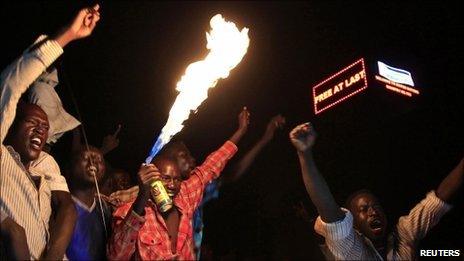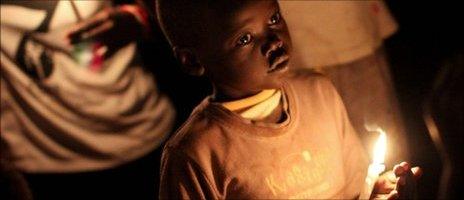South Sudanese celebrate their divorce
- Published

"Free at last" reads the sign in central Juba
With a thrilling roar of joy, at the stroke of midnight, South Sudan became the newest nation in the world.
"It is a shout of freedom," said Alfred Tut, lifting his head back and screaming.
A digital countdown clock in central Juba was a focal point, as vehicles packed with people waving flags, toured the streets, honking horns in celebration.
"Congratulations, free at last, South Sudan," the sign read.
The people did not need to read the message: They were already dancing and leaping into the air with happiness.
Officials had planned for people to hold a quiet celebration at home, with the formal declaration of independence later on Saturday morning.
"At midnight, bells will be rung across the new country, and drums will be sounded, to mark the historic transition from southern Sudan to the Republic of South Sudan," an earlier statement from the southern government had said.
But that clearly was not enough for the people, who simply could not wait to celebrate.
'Promised land'
Two hours before midnight and lines of cars zoomed around town, each blasting out a different tune.
Roundabouts became frenzied dance venues when trucks carrying giant speakers slowly passed by.

Some lit candles and said prayers for the new country
"We have waited too long for this special day, so we cannot sit indoors," said Atem Garang.
"I have come out because I cannot believe we have arrived at this point of a new nation after such a long, hard road of fighting."
Women ululated with high voices, men chanted.
"We are going, we are going to freedom," they sang.
"We are going to the promised land," said Bage William, who wore the flag of his new nation as a cloak, draped around his shoulder.
By the time the final countdown arrived, the atmosphere was wild.
Church bells rang the midnight hour but, in central Juba at least, the deafening sound of horns drowned them out.
"This is the day I have been waiting for since I cannot remember," said Mary Puok.
Groups of people ran down roads, dancing to drum beats.
Soldiers and policemen joined in too, waving paper flags and laughing - many were former fighters with the rebel Sudan People's Liberation Army (SPLA).
"I fought with the SPLA, and now we have won," said Gony Thon, a policeman, joining in the impromptu dance on the street.
Those who could not fit inside the cars hung out the windows, or sat on the roof.
One car had the sign plastered on the back window: "Just divorced."
Parties continued long into the night, as families and friends feasted on roasted goats specially killed for the occasion.
But there was also a quieter celebration too.
On back streets, outside homes, others had placed candles in simple celebration, as well as in memory for all those who died in the decades of conflict to reach this historic point.
The soft glow of flickering candles lit the way far down sandy tracks.
"I light candles in church when I say a prayer," said Alice Ajak, a mother, who lost two children during the long years of war.
"My candle here therefore is my prayer that my new country is one of peace, and where we can live without problems for now and in the future always to come."